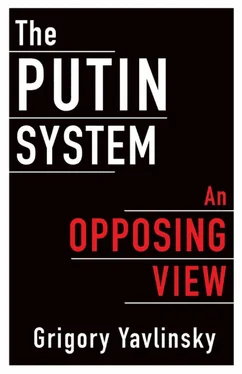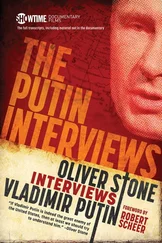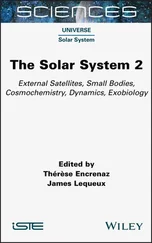See Grigory Yavlinsky, Realeconomik: The Hidden Cause of the Great Recession (and How to Avert the Next One) (New Haven, Conn.: Yale University Press, 2011).
Yavlinsky, Realeconomik .
In the first years of the twenty-first century, Russia’s economic system began absorbing very large windfall profits from the export of raw materials and hydrocarbons. These superprofits greatly reinforced and accelerated its political consolidation. The most significant stages of this process were as follows:
• the subordination of all politically influential media, with the destruction of the NTV media company (2000–2002);
• the deepening fusion of government power with the ownership of economic assets through an even greater subordination of businesses to the state, with President Putin’s tight personal control of all financial flows and the shrinking of the private sector of the economy (as exemplified by the prosecution of Yukos from 2003 on);
• the elimination of all autonomy whatsoever for regional elites, with the abolition of gubernatorial elections (2002);
• the unleashing of no-holds-barred propaganda in government-owned media; the reversal of the editorial policies of the previously influential democratic mass media through semi-involuntary transfers of their ownership rights to the largest government-owned public companies; the transformation of these media into tools of the ruling circle, serving their interests by manipulating public opinion (first and foremost the opinion of the educated class in Moscow and Saint Petersburg); and a drastic increase in the scale of election fraud (starting in 2003);
• the intimidation of society, beginning in 2012, including intimidation of young people (with the prosecution of the band Pussy Riot), of protest rally participants (with the prosecution of the Bolotnaya Square protesters), of human rights advocates and civic organizations (with the “foreign agent” labeling, in accordance with the newly passed law), and of the bureaucracy (with the prosecution of the former Defense Minister Anatoly Serdyukov); loud campaigns targeting various minorities (such as the campaign against “homosexual propaganda”); the campaign for the “nationalization of the elite”; and other actions; and
• active efforts to create a pervasive sense of a lack of alternatives to the status quo, regardless of the quality and the mistakes of the power holders.
Let me quote here an editorial published on August 16, 2013, by Vedomosti , Russia’s leading business paper: “The situation that we have with the ownership of large economic assets stinks. The holdings acquired in the course of privatization were not earned by their present owners. The transfer of property rights to the new owners of factories and coal mines looked like the return to a state of injustice and had a tinge of a royal grant in exchange for loyalty…. The government retains an implicit ‘golden share’ in large property holdings, especially in those that the Kremlin views as having a strategic value.”
Many observers have noted that, during the entire period of Mikhail Khodorkovsky’s imprisonment (and he explicitly confirmed it after his release), his confrontation with the government, in political terms, did not suggest—either then or today—an opposite or a fundamentally different direction for Russia’s development than the one that has been pursued by the Kremlin.
In actuality, private and government funds allocated by Western countries for “global democracy support” were rather limited, and even these funds were typically spent on personally enriching “professional democratizers,” with payments having rather tenuous connection to the actual outcomes of their work. The practical result of this “struggle for democracy,” in the West, was sustained public attention to a few dozen media stories and personalities whose high profiles were out of sync with their actual significance and impact in terms of power relationships in Russia, which was minimal at best.
This aspect of the situation is rarely mentioned, and yet it is critically important. The authorities cannot completely protect themselves against scathing critiques and outright invective. Mass access to the internet makes this physically and technically impossible—as developments in China have demonstrated, controlling discussions on the internet is not feasible even with much more rigid and effective surveillance of the population. Therefore, manipulating public opinion becomes the most potent means of counteracting criticism. Major mass media as well as the “niche” opposition outlets largely neutralize critics of the system by pushing to the fore issues and stories that appear inconsequential or preposterous to most of the country’s population. This may be done either intentionally or because of the outlets’ extremely low professional standards. The achievement of this goal is further simplified by the attitudes of a large part of the opposition-minded intelligentsia: viewing themselves as part and parcel of the global (Western) elite, they feel that they don’t have to take into consideration the needs, beliefs, tastes, and prejudices of the bulk of the population (which they brand “bumpkins,” “rednecks,” and holdovers from the Soviet era). As a result, instead of presenting issues that might animate the masses (such as the condition of the social safety net, the performance of the judiciary and law enforcement agencies, health care, and education), the agenda of the system’s critics gets filled with discussions of the personal ups and downs of individual oppositionists, infringements upon individual artists’ freedom of creativity, and other stories that cause a mixed and skeptical response among the depoliticized majority of Russians. The role of the politicized intelligentsia of Moscow and Saint Petersburg in the emergence, development, and consolidation of the system of peripheral authoritarianism in Russia deserves a separate and fairly blunt appraisal.
It is telling that, in their pronouncements, genuine supporters of the authoritarian system do not count the political parties represented in the Duma as opposition but, by default, as part and parcel of the national elite, consolidated around its official leader. See, for example, Grigory Dobromelov, “Two Years of Castling,” Expert [in Russian], September 24, 2013, http://expert.ru/2013/09/24/dva-goda-rokirovki.
In theory, an external threat can also play the role of such a constraint, but it has to be grave, tangible, and immediate. In present-day conditions, such situations occur infrequently, and it is even more rare for a ruling group to perceive them as such. Evidence shows that authoritarian regimes direct much more attention and resources toward preventing the emergence of potential domestic threats (such as riots, uncontrollable outbursts of violence and disobedience, or organized opposition) and toward fighting external opponents who are not among the most dangerous than toward protecting their countries against potential invasion by those who may actually pose such a risk.
I am talking here not about ideology in its broader sense, as an element of the social consciousness of a community of people, but rather about specific ideological systems that serve as political tools.
I will not discuss here the extent to which the principles on which Russia’s new economic system was being built were actually market-based. I addressed this subject in many of my prior works.
Читать дальше












